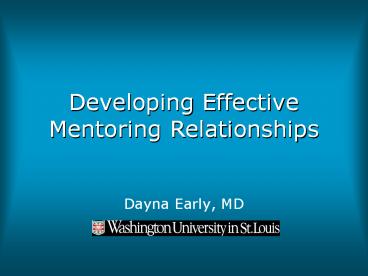Developing Effective Mentoring Relationships - PowerPoint PPT Presentation
Title:
Developing Effective Mentoring Relationships
Description:
time management skills. presentation skills. communication skills. Communication ... Communication was mostly email and phone, but meet face-to-face at DDW. ... – PowerPoint PPT presentation
Number of Views:195
Avg rating:3.0/5.0
Title: Developing Effective Mentoring Relationships
1
Developing Effective Mentoring Relationships
- Dayna Early, MD
2
(No Transcript)
3
- Expectations
- Communication
4
Expectations
- budget writing
- grant writing
- research design and funding
- promotion and tenure
- curriculum development
- resident teaching and evaluation
- practice management
- medico-legal issues
- negotiating contracts
- time management skills
- presentation skills
- communication skills
5
CommunicationSame institution/practice
- Face-to-face
- Initial contact face-to-face.
- Specific request for mentoring
- Informal contact as well as scheduled meetings
- Formal assessment--P T/partnership
- Division Director/Senior partner
- Electronic
- Provides convenient way to communicate on
straightforward issues - keeping in touch
6
CommunicationDifferent institution/practice
- Initial contact by phone or face-to-face.
- DDW or other national meeting
- Invite your mentor to speak
- Electronic
- Provides convenient way to communicate on
straightforward issues - keeping in touch
- Try to communicate once every month/every other
month
7
Communication
- Regular, usually focused.
- Do not assume that advice will be offered if it
is not solicited. - Be as specific as possible when asking for
advice. - Be considerate of your mentors time.
- Maintain confidences.
8
Communication
- Listen to what your mentor says, even if you
initially dont agree with it. - Show appreciation of your mentors time and
involvement. - Keep the lines of communication open with your
mentor, even after the formal mentoring
relationship has ended.
9
If the relationship isnt working talk with your
mentor
about ending it.
10
Scenario 1
- Nationally known scientist and leader
- Top positions in AGA
- Basic scientist
- Book editor
- Former Div Dir
- Junior faculty
- Research focus
11
Scenario 1, continued
- Communication was mostly email and phone, but
meet face-to-face at DDW. - Main interaction focused on grant writing and
manuscript review. - Current topics of discussion include career
direction. - Mentoring relationship has lasted at least 7-8
years.
12
Scenario 2
- Nationally known figure, primarily as an educator
and researcher - Long history of AGA involvement
- Program director at top medical school
- Junior faculty, research background but endoscopy
focus
13
Scenario 2, continued
- Initial contact electronic and intermittent.
- Meet yearly at DDW, continue electronic
communication. - Mentoring relationship focuses on career choices,
promotion and tenure. - Mentoring relationship has lasted 5 years.
14
Scenario 3
- Nationally recognized leader in AGA and ASGE.
- Academic clinician
- Top medical center
- Master endoscopist
- Junior faculty at small academic institution
- Endoscopy focus
- No significant mentoring at the time
15
Scenario 3, continued
- Initial contact phone, regular contact email.
- Meet face-to-face at DDW
- Mentor encouraged AGA/ASGE involvement, provided
multiple networking opportunities. - Mentee sought advice when making institution/job
change. - Mentoring relationship for 5 years.
16
AGA Career Development Program (CDP)
- The CDP Mentoring Project was first proposed in
1997 by the Gastroenterology Womens Coalition
(comprised of members from the AGA, ASGE, ACG,
and AASLD). - Administrated by the Womens Committee of the
AGA currently administered through the Trainee
and Education Committee of the AGA. - Designed to promote networking, and to encourage
involvement in AGA. - Pairs traditionally have been matched by clinical
academic/research/private/industry interest. Also
consider gender, specific areas of interest.
17
A firm commitment to the mentoring process and a
willingness to invest time and energy are the
most important components for a successful
relationship.
Mentoring is in many ways an elusive concept and
an individual process.































